The Horrors of Sam Moskowitz
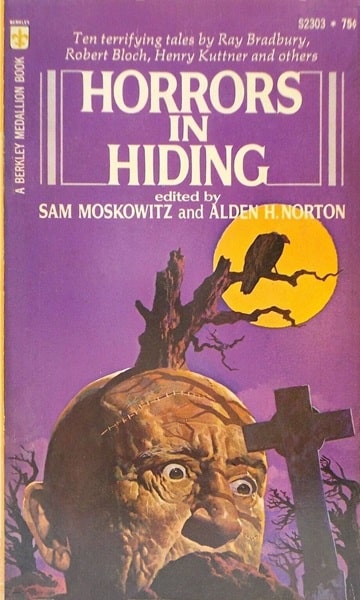 |
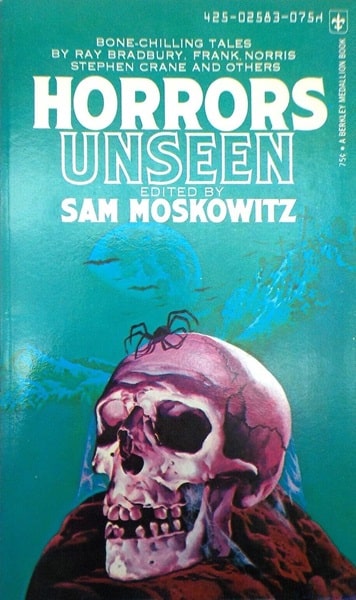 |
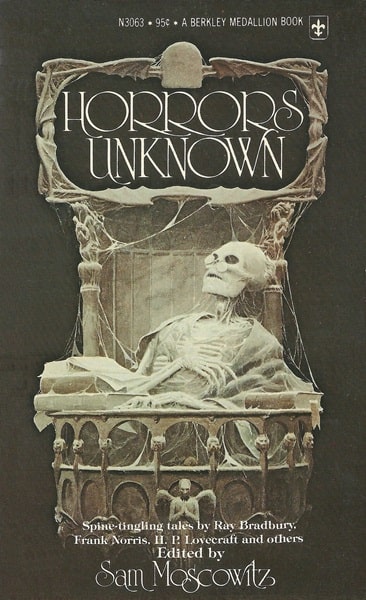 |
Horrors in Hiding, Horrors Unseen, and Horrors Unknown (Berkley Medallion, February 1973,
June 1974, and February 1976). Covers: Vincent Di Fate (x2), uncredited
A few years back I wrote a trio of Vintage Treasures pieces about a series of Berkley Medallion paperback horror anthologies from the mid-70s, all edited by Sam Moskowitz (with an assist from Alden H. Norton).
Horrors in Hiding (February 1973)
Horrors Unseen (June 1974)
Horrors Unknown (February 1976)
The last two were the final anthologies Moskowitz produced. I was planning to investigate one of Moskowitz’s classic science fiction anthologies this weekend — maybe Masterpieces of Science Fiction (1967), or Under the Moons of Mars (1970) — but by midnight Friday I was deep into a stack of his horror anthologies again. I’m mesmerized by those creepy covers, what can I tell you.
[Click the images for horrifying sizes.]
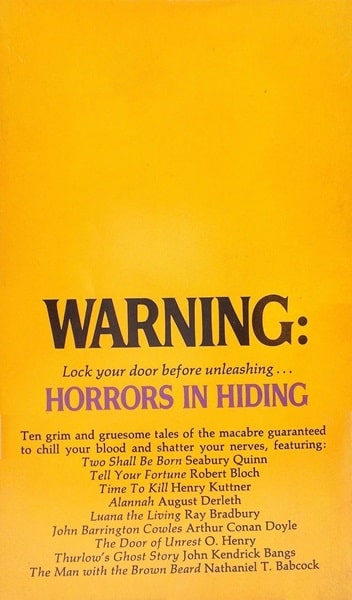 |
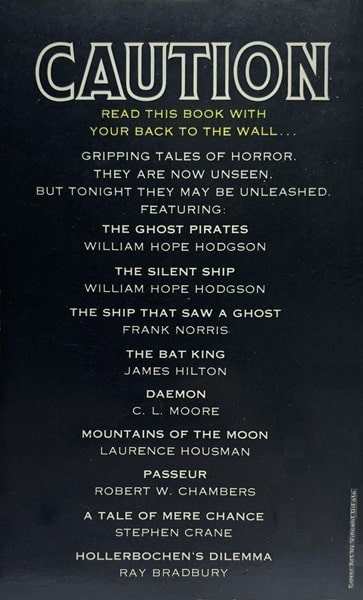 |
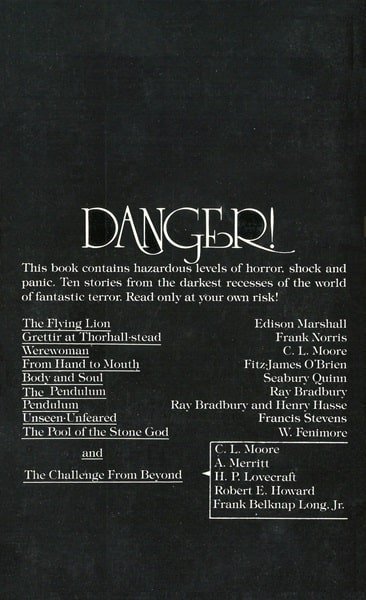 |
Back covers for Horrors in Hiding, Horrors Unseen, and Horrors Unknown
Moskowtiz was an interesting character. A professional magazine editor, he edited the trade journals Quick Frozen Foods and Quick Frozen Foods International for many years, and he gradually put his professional skills to use in the genre, starting in 1953 with Science-Fiction Plus, Hugo Gernsback’s last science fiction magazine. He began editing anthologies with Editor’s Choice in Science Fiction, published by McBride in 1954, and produced two dozen more over the next 20 years.
Moskowtiz (who sometimes published under the name “Sam Moscowtiz,” maybe because the ‘k’ on his typewriter was worn out?), was just as well known as a critic and genre historian. While still a teenager, he was one of the key organizers of the first Worldcon, held in New York City in 1939 (where he famously barred several Futurians, including Donald A. Wollheim, Fred Pohl, Robert A. W. Lowndes, Cyril Kornbluth, and others).
His genre histories and biographies, including Explorers of the Infinite and Seekers of Tomorrow, are still well worth reading today — as is his legendary history of fannish feuds, The Immortal Storm, which fan historian Harry Warner Jr. summed up with,
If read directly after a history of World War II, it does not seem like an anticlimax.
First Fandom still presents an annual award in Moskowitz’s memory each year at Worldcon.
Sam Moskowitz. Don’t look the mild
look fool you. The man knew how to feud.
Moskowitz/Moscowitz started with science fiction anthologies, and some very good ones. He partnered with Alden H. Norton for several fine SF books, including Award Science Fiction Reader (1966), Great Untold Stories of Fantasy and Horror (1969), and The Space Magicians (1971), and with Roger Elwood for Strange Signposts (1966), The Time Curve (1968), Alien Earth and Other Stories (1969), and Other Worlds, Other Times (1969), but the majority he produced under his own power.
While all his early anthologies collected classic science fiction, by 1971, with Horrors Unknown, Moskowitz had become more interested in packaging horror (possibly because horror sold better in the 70s, and the man had to save up for a new typewriter).
Four of his last six books were horror, and by the end of his career in the late 70s he was focused on paperback original horror anthologies for Berkley Medallion.
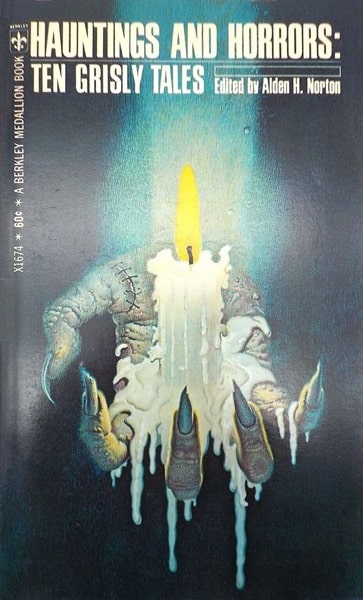 |
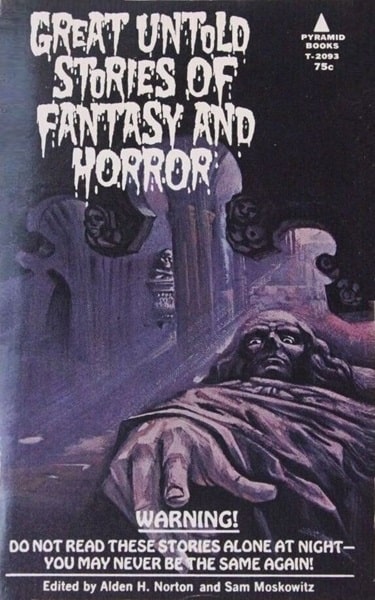 |
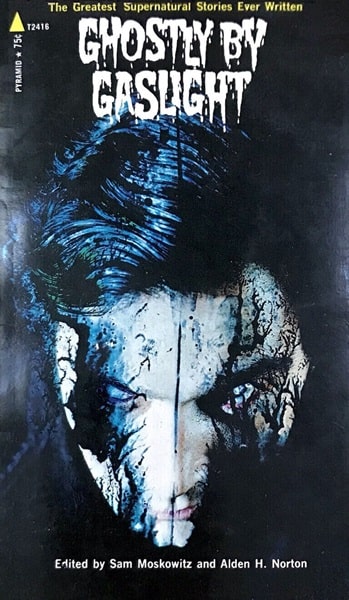 |
Three Alden and Moskowitz anthologies: Hauntings and Horrors: Ten Grisly Tales
(Berkley Medallion, March 1969), Great Untold Stories of Fantasy and Horror
(Pyramid Books, October 1969), and Ghostly by Gaslight
(Pyramid Books, February 1971). Covers uncredited
Moskowitz’s paperback horror anthologies collected classic tales from Weird Tales and other pulp magazines, with writers like C. L. Moore, Seabury Quinn, Francis Stevens, Ray Bradbury, A. Merritt, Robert Bloch, Henry Kuttner, August Derleth, and many others.
My interest in Moskowitz quickly led me to Alden H. Norton, who produced many fine horror anthologies of his own, including Horror Times Ten (1967), Masters of Horror (1968), and Hauntings and Horrors: Ten Grisly Tales (1969).
These books are highly collectable. By which I mean, of course, they’re inexpensive and look great on your bookshelf. Check them out.
Next week (assuming I ever drag myself away from these old horror anthologies) we’ll return to our regularly scheduled Vintage Treasures, with a look at a single book. Probably Fritz Leiber’s classic collection Night’s Black Agents. Stay tuned.
See all our recent Vintage Treasures here.
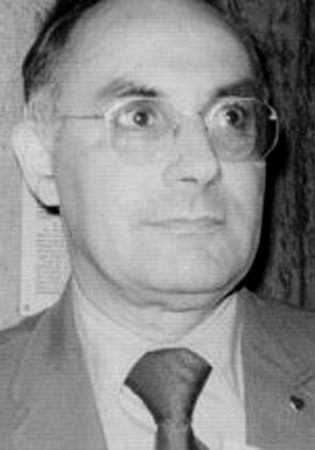
Hi, John.
While the statement about Sam barring Asimov & company is true, stating it without context makes him sound like an ignorant asshat.
Hugo Gernsback’s preferred method of payment was by threat of lawsuit or busted kneecap.
Several of the Futurians had not been paid and were understandably unhappy about that.
Gernsback had started a number of science fiction clubs to boost the sales of Amazing Magazine.
In revenge, the Futurians would join chapters of the Science Fiction League, take them over, and dissolve them.
Sam wanted the Futurians to promise to behave themselves at the Worldcon.
Asimov promised and was admitted without incident.
The others boycotted the gathering.
This was all just teenage melodrama.
To the best of my knowledge there were no lasting hard feelings.
I know Asimov and Wollheim spoke at a special (I believe it was the 35th anniversary) meeting of Sam’s group, the Eastern Science Fiction Association.
I witnessed Isaac and Sam happily chatting at local conventions.
Hi Philip,
You are spot on with your comments on Asimov. I didn’t mention Asimov in the list of folks barred, but you’re quite right that he attended the con. He and Sam were friends for decades, and in fact Asimov dedicated Before the Golden Age to him.
It was, indeed, teenage melodrama, but over the years the feud has become a huge part of fannish legend. In no small part due to the importance of the personalities involved. Without Asimov, Wollheim, Pohl, and the others, American SF would have looked vastly different (and been hugely poorer).
With a name like like Sam Moskowitz and a pedigree like “Quick Frozen Foods” and “Quick Frozen Foods International” I actually thought for a moment that you might being sneaking in a preemptive April Fools gag. Fortunately Sam was a real person and these anthologies are very real could have been tailor made for me. How I’ve never seen or heard of them before baffles me. To each their own but my interest in horror wanes quickly as the seventies progressed and these could have easily (and perhaps more appropriately) been published during the mass market horror heydays of the early sixties. Lots of curios here including some by non-genre authors. I’ll be stocking up on these all summer in preparation for the fall. Thanks much for the tip.
Byron,
Glad you enjoyed the article, and thanks for the kind comments.
> How I’ve never seen or heard of them before baffles me.
That’s one thing about the 70s era of mass market paperbacks that I often forget. Yes, there were numerous science fiction anthologies published, original and reprint, and the days when that was a viable business proposition are over, and I miss them. There were many more distributors in those days, and you found paperbacks everywhere — at the supermarket, the drugstore, and right next to the checkout line at Woolworths. Publishers (like DAW) were also more willing to take chances on new writers than they were today, and that allowed many, many writers to enter the field and learn their craft. The barriers to entry to professional publishing are much higher today, and I think the field is much poorer for it.
But the flip side of all that low cost, low risk publishing was that books simply didn’t stay on the shelves for long. Mass market paperbacks were on spinner shelves at supermarkets for weeks (if not days) and then pulled and pulped. There was no resource like Amazon to discover and order books you may have missed. If you didn’t catch books on the shelves (and the vagaries of national distribution were vast and inexplicable), they were gone. And once they were gone, they were gone for good.
Yes, there were many more cheap paperbacks published in those days. But it was very easy to miss a title, and never even know it existed. I still discover treasures I somehow missed on the shelves in the heyday of my own collecting. That’s what makes things like paperback conventions (like the upcoming WINDY CITY PULP AND PAPER SHOW here in Chicago) so magical every year.
I’m very puzzled myself. I’ve been a collector of horror anthologies for many years but I never heard of these Moskowitz books. They completely escaped my attention!
Mario,
That’s why I enjoy talking about these old vintage treasures so much. There’s always a few readers and collectors out there hearing about them for the first time!
[…] SAM I AM. John O’Neill’s “The Horrors of Sam Moskowitz” at Black Gate begins its discussion of a series of horror anthologies with this discussion of their […]
I have copies of Hiding and Unknown, both of which are great reading fun. Whenever I see these old paperback anthologies from the 60’s, 70’s and 80’s I usually snap them up, despite the risk of story overlap between collections. They are just so awesome!
Stan,
Hear! Hear! I had a quick look today, and all of these titles are currently available on eBay and at other online sellers — often for much less than the cost of a new paperback (and sometimes with free shipping!). It’s a great time to be a paperback collector.
Here’s a sample of the over two dozen listings I found on eBay today when I searched for ‘Horrors’ and ‘Moskowitz’
Thanks for the suggestion and endorsement